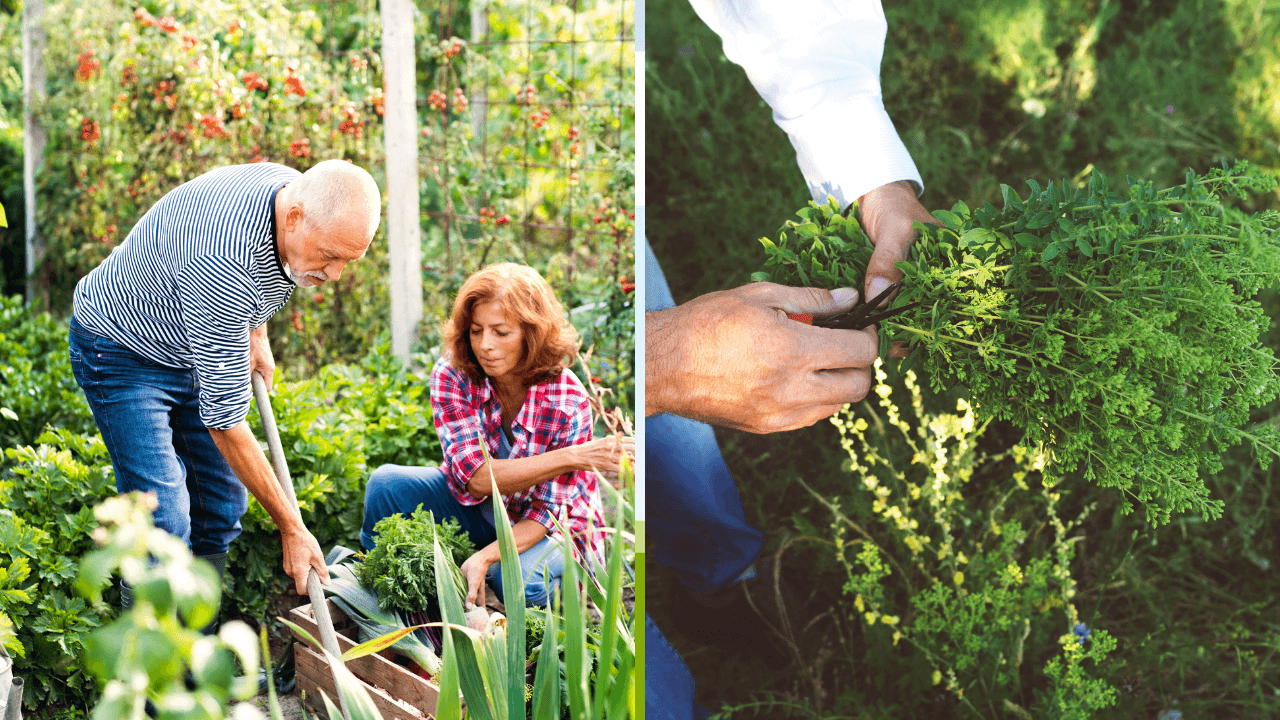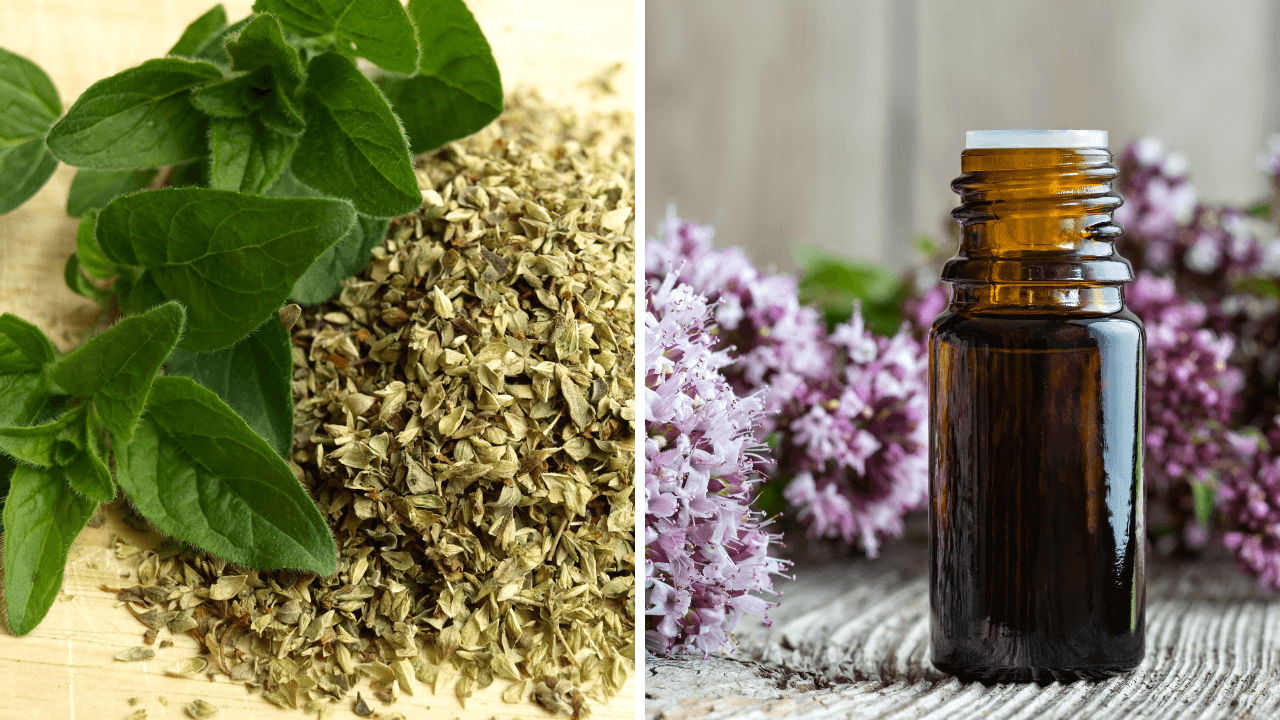Hey there, garden enthusiasts! Bertie here! Today, we’re diving into the delightful world of lemon balm. 🌿
This charming herb isn’t just a pretty plant; it’s a powerhouse of benefits that can transform your garden, kitchen, and even your medicine cabinet.
Ready to explore? Let’s get started!
Key Takeaways
- Lemon balm is a versatile herb with numerous health benefits and culinary uses.
- Lemon balm can be used for medicinal purposes, culinary delights, and even in beauty products.
- Growing lemon balm is straightforward, requiring minimal care and thriving in various conditions.
First, I want to show you pics of my own lemon balm plant! It is growing like a weed! 🌿(Pardon the pun. LOL!)



Three views of my growing lemon balm plant with it as a baby plant in the middle
Table of Contents
What is Lemon Balm?

Lemon balm, known scientifically as Melissa officinalis, is a perennial herb from the mint family. (So it will spread in your herb garden like mint! Best to keep it separated or containerized.)
This calming herb goes by many names, including bee balm and honey plant, and, yes, Melissa, reflecting its sweet fragrance and its attractiveness to bees. Its lemony scent and vibrant green leaves have made it a favorite since ancient times.
Whether you’re brewing a comforting cup of lemon balm tea (recipe below), taking lemon balm supplements for health benefits, or using lemon balm essential oil for its soothing effects, you’re tapping into the power of this wonderful herb.
So if you’re a seasoned gardener or a newbie like me, lemon balm is a fantastic addition to any garden.
Health Benefits of Lemon Balm

Lemon balm isn’t just for cooking – it’s packed with health benefits too! It’s known for its calming properties, making it a great natural remedy for stress and anxiety.
The compounds in lemon balm, like rosmarinic acid, help promote relaxation and improve mood. A cup of lemon balm tea can be just what you need to relax. 🍵
But that’s not all. I've learned that lemon balm also boasts antiviral and antibacterial properties, making it useful for treating cold sores and improving digestion. It can even boost cognitive function, helping you stay sharp. (Wow! Another powerful herb in our garden!)
Medicinal Uses
You can enjoy lemon balm’s benefits in various forms like leaves for tea, ointments, creams, essential oils, and even capsules. You can see all of the products that contain this amazing herb on Amazon here.
Lemon balm can help with:
- Anxiety and Stress Relief: Brew it as a tea or take it as a supplement.
- Digestive Aid: Relieve bloating and indigestion with its soothing properties.
- Cold Sores: Apply a lemon balm ointment to speed up healing.
Clinical trials and studies have also shed light on the impressive health benefits of lemon balm.
One such trial revealed that a herbal blend containing lemon balm, along with valerian, hops, and chamomile, is effective in reducing anxiety and aiding in sleep. (Mount Sinai: Lemon Balm)
What's more, research also supports the use of lemon balm in treating indigestion, with some studies suggesting it has antibacterial activity that could contribute to improved digestive health. (Healthline:10 Benefits of Lemon Balm and How to Use It by Emily Cronkleton.)
Beauty and Skincare

Lemon balm is great for your skin too! Its antibacterial and anti-inflammatory properties make it a fantastic ingredient in skincare products. Here's a link to some of the lemon balm beauty products on Amazon!
And you can create a simple toner by steeping the leaves in hot water for about 5 minutes and applying it to your face with a cotton pad. It helps soothe irritated skin and reduce redness.
Growing Lemon Balm

Growing lemon balm is a breeze, and trust me, even if you don’t have a green thumb, you can do this!
You can start out with a plant from your local plant nursery (which I did); or plant your lemon balm seeds or seedlings in well-drained soil and in a spot that gets plenty of sunlight.
They’ll thrive in both full sun and partial shade. Keep the soil moist but not waterlogged. Also remember what I mentioned earlier that it is part of the mint family and will overtake your other herbs if not contained!
One of the best things about lemon balm is its resilience. It can handle various conditions, making it perfect for any garden.
Just give it a little love with regular watering and the occasional trim to encourage new growth. I just trimmed up my plant. Here's the trimmed version!

Companion Planting
In the garden, lemon balm works wonders as a companion plant. Its strong scent deters pests like mosquitoes and flies, making it a natural insect repellent.
Plus, it attracts beneficial insects like bees and butterflies, promoting a healthy garden ecosystem. Common sage or rosemary are two excellent companions for lemon balm.
Harvesting Your Lemon Balm
Harvesting lemon balm is simple and rewarding. The best time to do this is in the morning after the dew has dried.
Just snip off the leaves or stems with scissors or garden shears. You can use the leaves fresh or dry them for later use.
Hang the stems upside down in a cool, dark place until the leaves are crispy.
Storing and Preserving
To enjoy lemon balm year-round, you can store it in the refrigerator for up to a week. For longer storage, dry or freeze the leaves.
Dried lemon balm should be kept in an airtight container away from direct sunlight. I've seen most people use regular Mason jars.
Freezing is easy too – just spread the leaves on a baking sheet, freeze, and then transfer to a freezer-safe container.
Culinary Delights with Lemon Balm

Lemon balm’s citrusy flavor is a fantastic addition to many dishes. Add it fresh to salads, soups, and sauces, or use it to flavor fish, chicken, and vegetables.
One of my favorite ways to enjoy lemon balm is in a soothing herbal tea. Just steep the fresh or dried leaves in hot water, and voila – a calming, aromatic tea perfect for unwinding after a long day.
Here is a delightful recipe from Sue Moran at "the view from great island."
How to Make Lemon Balm Tea
I'll show you how to make lemon balm tea from fresh or dried lemon balm ~ this soothing caffeine free herbal tea is relaxing and helps you ease into sleep. It's good for the digestion, too!
Servings: 4 servings Author: Sue Moran
Ingredients
· 20 fresh lemon balm leaves Note: if using dried lemon balm, use about 2 tablespoons.
· lemon slices for garnish
· honey to taste, optional
Instructions
1. Bring 1 quart purified water to a boil.
2. Put lemon balm leaves in a tea pot.
3. Pour the water over the lemon balm leaves, stir, and let steep for 10 minutes.
4. Pour or strain into your tea cup or mug. Add honey to taste. Garnish with a slice of lemon and a lemon balm leaf or two.
Notes
safety note: If you’re growing your own lemon balm, and using the dried leaves for tea, there is little side effect risk.
But herbs and supplements are not monitored by the Food and Drug Administration and there may be issues with purity, quality, or safety. Read more information about side effects and risks here.
Other ways to use lemon balm
· The leaves can be added to salads.
· Make the tea into a lemon balm jelly.
· The Greeks and Romans infused lemon balm into their wine!
Nutrition
Serving: 1cup | Calories: 1kcal | Carbohydrates: 0.1g | Protein: 0.04g | Fat: 0.01g | Saturated Fat: 0.003g | Polyunsaturated Fat: 0.01g | Sodium: 0.3mg | Potassium: 6mg | Fiber: 0.1g | Vitamin A: 42IU | Vitamin C: 0.3mg | Calcium: 2mg | Iron: 0.1mg
Aromatherapy and DIY Projects
Lemon balm’s soothing scent is perfect for aromatherapy. Use its essential oil in diffusers, massage oils, or baths to reduce stress and promote relaxation.
You can also use dried leaves in sachets, potpourri, or homemade candles for a fresh, lemony aroma around the house. We'll have more DIY projects in upcoming articles!
Safety and Precautions
Lemon balm is generally safe, but as with any herb, it’s wise to consult a healthcare provider if you’re pregnant, breastfeeding, or have a thyroid condition.
It’s also a good idea to stop using lemon balm two weeks before any scheduled surgery to avoid excessive drowsiness.
Always do your due diligence and consult with your health provider when using any herbs, for medicinal use.

In Summary
Lemon balm is a versatile and easy-to-grow herb that brings a host of benefits to your garden, kitchen, and wellness routine.
From calming teas to refreshing culinary uses, and even skincare, lemon balm is a must-have in any home.
Got questions or tips about growing and using lemon balm? Drop them in the comments – I’d love to hear from you!
We've included a handy chart of twelve things to do with lemon balm that you can download or print out! Source: the nerdyfarmwife.com


How does lemon balm affect the brain?
Research shows that lemon balm may affect the brain by increasing GABA levels, which is a mood regulator that prevents neurons from becoming overexcited, potentially helping to alleviate restlessness and anxiety.
What is lemon balm used for?
Lemon balm is used for cold sores, anxiety, stress, insomnia, indigestion, and can also be used in cooking and brewing herbal tea. It offers a variety of benefits for both health and culinary purposes.
How can I grow my own lemon balm?
You can grow your own lemon balm by planting lemon balm seeds in the spring. Lemon balm is easy to grow and requires minimal care, thriving in various conditions.
Are there any side effects to using lemon balm?
In conclusion, lemon balm is considered safe, but some people may experience rare side effects such as nausea, dizziness, increased appetite, or wheezing. Be aware of these potential effects when using lemon balm.
Can pregnant women use lemon balm?
It is recommended for pregnant women to avoid using lemon balm due to the lack of established safety.
Thanks for stopping by our beehive and reading about lemon balm! It is surely an important herb to have in our gardens!
I've published several other articles on herbs you might enjoy as well:
- Herb Gardening Bliss: A Lively Update on Bertie's Growing Herb Garden
- Sage Wonders: Discovering the Top Health Benefits and Versatile Uses of the Ageless Herb
- Exploring What Is Chamomile: Health Benefits and Beyond
In addition to those, we've covered basil and ashwagandha as well! Just check out our webpage and search for herbs!

Bertie
Before you leave, if you haven't already done so, please subscribe so you will be the first to see reviews you can rely on.










Member discussion